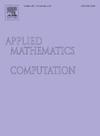信道未知、带宽有限的多智能体系统的共识控制
IF 3.4
2区 数学
Q1 MATHEMATICS, APPLIED
引用次数: 0
摘要
研究了信道衰落和通信带宽有限情况下多智能体系统的一致性问题。这些问题将分别导致通信数据的不准确和能量约束,MASs不可能达成共识。为此,本文提出了一种可变结构编解码方案(VS-EDS),该方案包括一个带有单一信号发生器的编码器和一个带有自适应激活模块的相应解码器。所提出的VS-EDS的优势主要体现在三个方面。首先,它避免了现有方法在系统运行前对衰落增益的统计进行大量的统计工作。其次,它可以消除因衰落引起的通信误差。同时,它能适应不断变化的通信网络环境。此外,为了实现共识控制,设计了基于VS-EDS的分布式协议。最后,通过对比仿真验证了该系统的可行性和有效性。本文章由计算机程序翻译,如有差异,请以英文原文为准。
Consensus control for multi-agent systems with unknown fading channels and limited bandwidth
This paper is concerned with the consensus of multi-agent systems (MASs) in the presence of fading channels and limited communication bandwidth. These issues will lead to inaccurate and energy constraints of communication data respectively, which will not be possible for MASs to achieve consensus. To this end, this paper proposes a variable structure encoding-decoding scheme (VS-EDS), which includes an encoder with a unitary signal generator and a corresponding decoder with an adaptive activation module. The advantages of the proposed VS-EDS are mainly in three aspects. First, it avoids the need for existing methods to perform a large amount of statistical work on the statistics of fading gains before the system runs. Second, it can eliminate the communication errors caused by fading. At the same time, it can adapt to the changing communication network environment. In addition, in order to achieve consensus control, a distributed protocol based on the VS-EDS is designed. Finally, the feasibility and effectiveness of the VS-EDS are demonstrated through comparative simulations.
求助全文
通过发布文献求助,成功后即可免费获取论文全文。
去求助
来源期刊
CiteScore
7.90
自引率
10.00%
发文量
755
审稿时长
36 days
期刊介绍:
Applied Mathematics and Computation addresses work at the interface between applied mathematics, numerical computation, and applications of systems – oriented ideas to the physical, biological, social, and behavioral sciences, and emphasizes papers of a computational nature focusing on new algorithms, their analysis and numerical results.
In addition to presenting research papers, Applied Mathematics and Computation publishes review articles and single–topics issues.

 求助内容:
求助内容: 应助结果提醒方式:
应助结果提醒方式:


